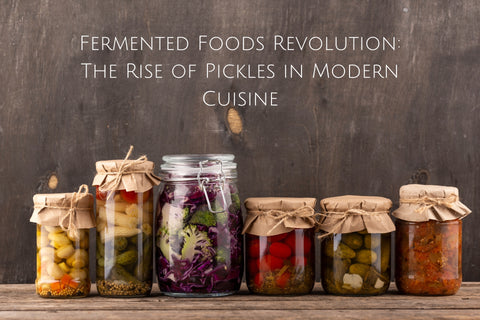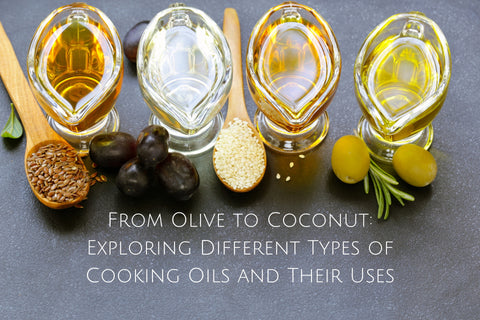Introduction:

Welcome to the era of the fermented foods revolution! In recent years, there has been a noticeable resurgence of interest in traditional food preservation techniques, with fermented foods taking the spotlight. Among these fermented delicacies, pickles have emerged as one of the stars of modern cuisine. In this blog, we'll delve into the fascinating world of pickles, exploring their history, health benefits, and the creative ways they're being incorporated into contemporary dishes.
A Brief History of Pickling:

Pickles, those ubiquitous briny companions to burgers and sandwiches, boast a surprisingly long and fascinating history. Their journey takes us across continents and cultures, highlighting the ingenuity of preserving food and the enduring love for a good pucker!
Ancient Origins:
- The exact origins of pickling are shrouded in time, but archaeological evidence suggests it's one of the oldest methods of food preservation.
- Mesopotamia (present-day Iraq) and the Indus Valley Civilization (present-day Pakistan and northwestern India) have shown signs of pickling practices dating back as far as 2400 BCE.
- Cucumbers, native to India, were likely some of the first vegetables to be pickled in the Tigris Valley.
Pickling Across Civilizations:
- Pickling techniques spread through trade routes, becoming a staple across various cultures:
- Egyptians: Pharaohs enjoyed pickled vegetables, even believing they held medicinal properties.
- Greeks and Romans: Used pickling to preserve vegetables and meats during travel and military campaigns.
- Chinese: Developed fermentation techniques using vegetables like cabbage to create kimchi, a staple still enjoyed today.
The Rise of Spices and the Spice Trade:
- The Middle Ages saw a surge in pickling due to the introduction of spices like peppercorns, mustard seeds, and dill.
- These spices not only enhanced flavor but also potentially aided preservation.
- The spice trade routes, particularly the Silk Road, further propelled the popularity of pickling.
Pickles and Exploration:
- European explorers in the 15th and 16th centuries carried pickles on long voyages to prevent scurvy, a vitamin C deficiency.
- Pickled vegetables were a valuable source of nutrients and helped prevent food spoilage during these long journeys.
Pickles Around the World:
- Pickling traditions continue to thrive globally, with regional variations reflecting local ingredients and spices.
- From German sauerkraut to Korean kimchi and Japanese umeboshi plums, pickled vegetables are a delicious and diverse part of culinary cultures.
Health Benefits of Pickles:

The Power of Fermentation:

The key to a pickle's potential health benefits lies in the fermentation process. This natural process utilizes microorganisms to break down sugars and starches in cucumbers (or other vegetables), creating beneficial byproducts like:
- Probiotics: These live bacteria contribute to a healthy gut microbiome, which is crucial for digestion, immune function, and even mood regulation.
- Lactic Acid: This acid not only adds the signature tangy flavor to pickles but also helps preserve them and potentially inhibits the growth of harmful bacteria.
Unpacking the Pickle Powerhouse:

Here's a closer look at some of the potential health benefits associated with pickles:
- Digestive Aid: The probiotics in pickles may aid digestion by promoting a healthy balance of gut bacteria. This can potentially alleviate bloating, constipation, and other digestive issues.
- Immune System Support: A healthy gut microbiome is linked to a stronger immune system. The probiotics in pickles may contribute to this by helping your body fight off harmful pathogens.
- Hydration Booster: Pickles are high in water content and electrolytes like sodium and potassium. They can be a helpful way to stay hydrated, especially on hot days or after exercise.
- Source of Vitamins and Minerals: Pickles can provide essential vitamins and minerals depending on the type of pickling process and vegetables used. Some pickles may be a good source of vitamin K, important for blood clotting and bone health.
Creative Uses in Modern Cuisine:
While pickles have long been enjoyed as a condiment or side dish, chefs and home cooks alike are finding innovative ways to incorporate them into a wide array of dishes. From pickle-infused cocktails to pickle-brined fried chicken, the possibilities are endless. Pickles add a burst of flavor and acidity that can elevate everything from sandwiches and salads to tacos and sushi rolls. They can also be used to balance rich or fatty foods, adding a refreshing contrast to dishes.
DIY Pickling:

One of the joys of the pickle renaissance is the opportunity for home cooks to experiment with DIY pickling. Whether you're fermenting cucumbers, carrots, radishes, or even watermelon rinds, the process is relatively simple and requires minimal equipment. All you need is a jar, vegetables, salt, water, and your choice of seasonings. With a bit of patience and creativity, you can create custom pickles tailored to your taste preferences.
Why We Love Pickles:

So, what's behind the pickle craze? Here are a few reasons why these fermented favorites are capturing hearts (and taste buds):
- Flavor Explosion: Pickles offer a unique combination of salty, sour, and sometimes spicy flavors that can elevate any dish.
- Health Benefits: The fermentation process enhances the nutritional profile of vegetables, making pickles a source of probiotics and essential vitamins.
- Versatility: Pickles can be enjoyed on their own, as a side dish, or incorporated into countless recipes.
- Budget-Friendly: Pickling is a great way to preserve vegetables and reduce food waste, making it an economical choice.
Conclusion:

As we embrace the fermented foods revolution, pickles have secured their place as a beloved staple of modern cuisine. With their tangy flavor, crisp texture, and array of health benefits, they offer a delicious and nutritious addition to any meal. Whether enjoyed straight from the jar or incorporated into creative dishes, pickles continue to delight taste buds and inspire culinary innovation. So, next time you're craving a snack or looking to add a zingy twist to your cooking, reach for a pickle and join the revolution!




Comments (0)
There are no comments for this article. Be the first one to leave a message!